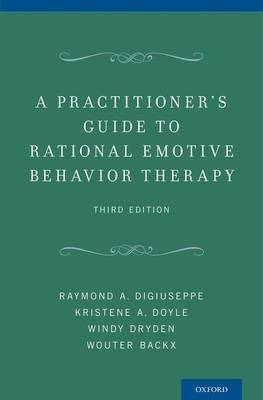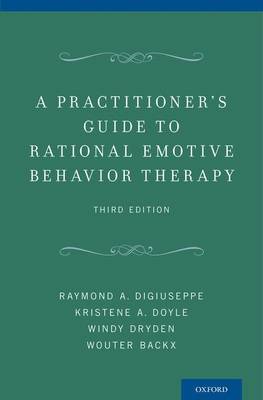
- Afhalen na 1 uur in een winkel met voorraad
- Gratis thuislevering in België vanaf € 30
- Ruim aanbod met 7 miljoen producten
- Afhalen na 1 uur in een winkel met voorraad
- Gratis thuislevering in België vanaf € 30
- Ruim aanbod met 7 miljoen producten
Zoeken
Practitioner's Guide to Rational Emotive Behavior Therapy
Raymond A Digiuseppe, Kristene A Doyle, Windy Dryden, Wouter Backx
Paperback | Engels
€ 201,45
+ 402 punten
Omschrijving
Extensively updated to include clinical findings over the last two decades, this third edition of A Practitioner's Guide to Rational-Emotive Behavior Therapy reviews the philosophy, theory, and clinical practice of Rational Emotive Behavior Therapy (REBT). This model is based on the work of Albert Ellis, who had an enormous influence on the field of psychotherapy over his 50 years of practice and scholarly writing. Designed for both therapists-in-training and seasoned professionals, this practical treatment manual and guide introduces the basic principles of rational-emotive behavior therapy, explains general therapeutic strategies, and offers many illustrative dialogues between therapist and patient. The volume breaks down each stage of therapy to present the exact procedures and skills therapists need, and numerous case studies illustrate how to use these skills. The authors describe both technical and specific strategic interventions, and they stress taking an integrative approach. The importance of building a therapeutic alliance and the use of cognitive, emotive, evocative, imaginal, and behavioral interventions serves as the unifying theme of the approach. Intervention models are presented for the treatment of anxiety, depression, trauma, anger, personality disorders, and addictions. Psychologists, clinical social workers, mental health counselors, psychotherapists, and students and trainees in these areas will find this book useful in learning to apply rational-emotive behavior therapy in practice.
Specificaties
Betrokkenen
- Auteur(s):
- Uitgeverij:
Inhoud
- Aantal bladzijden:
- 416
- Taal:
- Engels
Eigenschappen
- Productcode (EAN):
- 9780199743049
- Verschijningsdatum:
- 7/08/2013
- Uitvoering:
- Paperback
- Formaat:
- Trade paperback (VS)
- Afmetingen:
- 155 mm x 231 mm
- Gewicht:
- 544 g

Alleen bij Standaard Boekhandel
+ 402 punten op je klantenkaart van Standaard Boekhandel
Beoordelingen
We publiceren alleen reviews die voldoen aan de voorwaarden voor reviews. Bekijk onze voorwaarden voor reviews.











